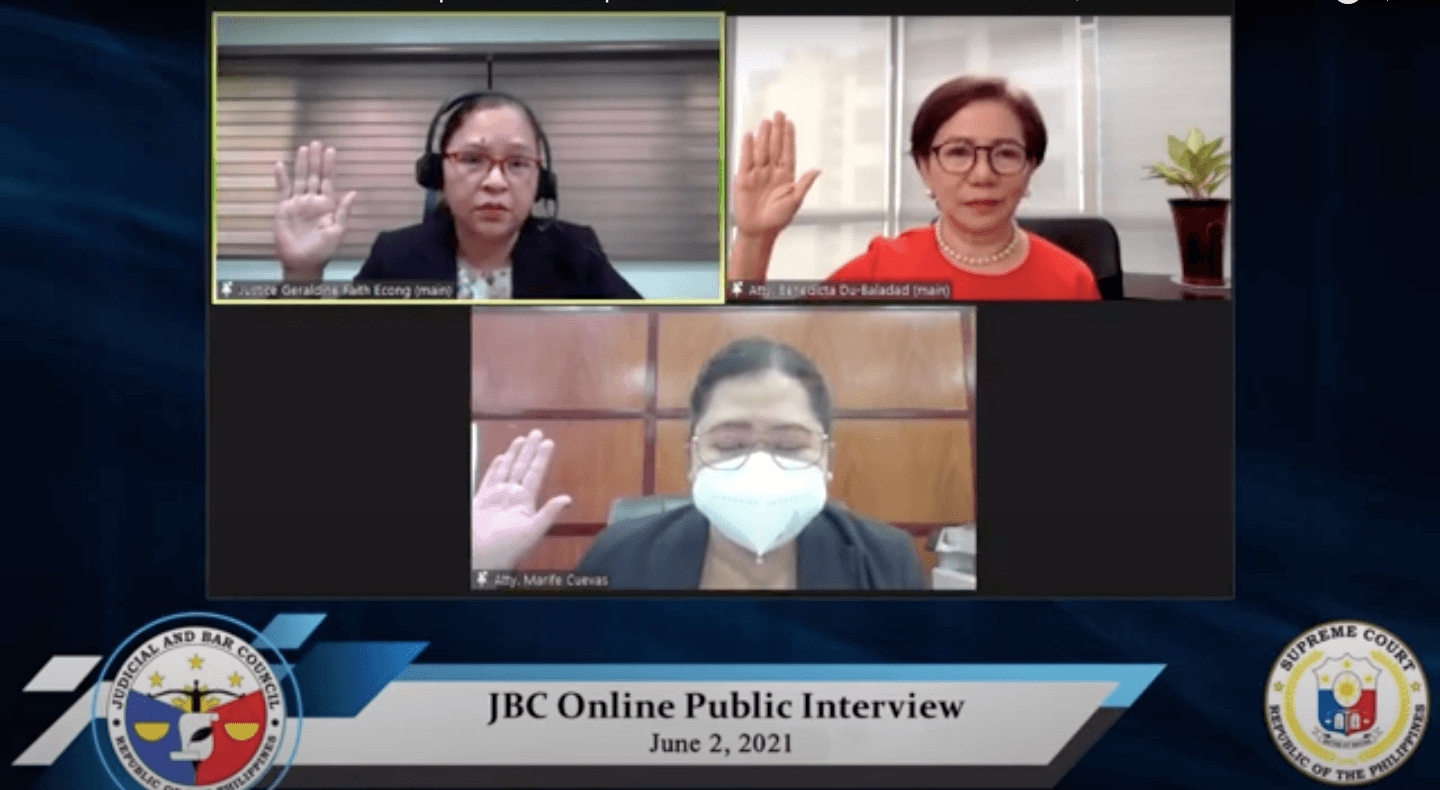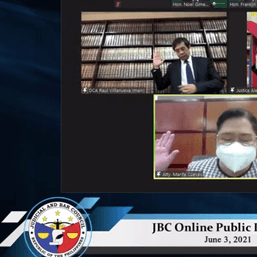SUMMARY
This is AI generated summarization, which may have errors. For context, always refer to the full article.

One of the biggest problems of the judiciary is a decline in public trust, and that is largely due to perception, a private lawyer boldly told Chief Justice Alexander Gesmundo on Wednesday, June 2, during her application interview for the position of Supreme Court justice.
“The trust ratings indicate that it looks like the judiciary’s trust, the trust of the people on the judiciary has declined and we have to arrest that because the judiciary is at the heart of a democratic society like ours, so we cannot afford to have that decline,” lawyer Benedicta Du-Baladad told Gesmundo, who was interviewing her as ex-officio chairman of the Judicial and Bar Council (JBC).
Du-Baladad, who was previously part of government, specifically the Bureau of Internal Revenue, said “there has to be a holistic understanding of the root causes of this that would involve a study of the people, structure of the institution, infrastructure, and procedures.”
JBC’s retired justice Noel Tijam asked, “Is it safe to assume that generally, people who distrust the Supreme Court are people who have an ax to grind and who lost at the Supreme Court?”
“It’s not an all-encompassing assumption,” said Du-Baladad, asserting that even people who have not had any transaction with the Court are asked by agencies that release trust rating index data.
Tijam further scrutinized Du-Baladad’s statement: “Is it possible that public perception is due to the fact that generally, the public is not fully aware of what happens inside the Court when they deliberate?”
Not a popularity contest
Tijam’s reaction is expected for someone who built a career in the judiciary.
Judges and justices assert that they don’t make decisions based on what’s popular, but on what’s legal or constitutional. Some take pride in being unpopular, if that means they cannot be swayed by public opinion. This, they say, is what differentiates them from politicians.
Tijam grilled Du-Baladad further: “Should we be bothered about it? Or should the Supreme Court just go along and do what is right, without taking cognizance of what is acceptable by the public?”
“When you do what is right, whether it’s acceptable or not, then that should be it. But if the perception is widespread then you begin to think whether it is really the cause of the perception,” said Du-Baladad.
A fellow applicant, Sandiganbayan Justice Rafael Lagos, who also rose through the ranks in the judiciary, said: “I don’t believe that the Supreme Court should be swayed by surveys or performance ratings done by polling agencies.”
The legislative and executive branches, Lagos said, “worry” about how to “make people happy because these are positions which need popular support.”
Lagos dissented in the decision to grant bail to Jinggoy Estrada in the pork barrel scam, and was part of the division that convicted Imelda Marcos of seven counts of graft.
Lagos’ 5th Division, however, granted Marcos post-conviction bail even though the former first lady ignored her verdict, a ground to cancel post-conviction bail. The 5th Division said it was following the Supreme Court’s Enrile doctrine on humanitarian considerations due to old age.
“The judiciary members don’t need popular support, they have security of tenure. For me it doesn’t matter [that] bad ratings come up as long as members believe they’re doing their job,” said Lagos.
Perception keeps SC in check
But without a popularity contest, who watches the Court?
“Public perception of the Court, it seems, can keep the institution in check,” wrote UP Law professor Dan Gatmaytan in his book, More Equal Than Others.
In 2006, the Supreme Court voted 8-7 to end attempts to extend former president Gloria Arroyo’s term through a People’s Initiative for a Charter Change.
That decision, Gatmaytan wrote, was because “the Court may have been wary of the potentially volatile response of the public to another Javellana decision,” referring to the Marcos-time decision that upheld the railroaded 1973 Constitution, paving the way for the feared policies under the dictatorship.
“After all, it may be that the mere threat of another people power uprising finally helped to end Arroyo’s campaign to change the Constitution,” wrote Gatmaytan.
As Du-Baladad said: “We have to reform ourselves, we have to show the public that there is a change, we are doing a change in perception whether removing perception that justices can be sold. Those are things we have to look into, zero in on cause of that perception.”
Reaction to the Court’s decisions
One of the most unpopular recent decisions of the Supreme Court is the quo warranto ouster of former chief justice Maria Lourdes Sereno, a narrow 8-6 decision that one of the dissenters called a “legal abomination.” That decision was penned by Tijam.
Court of Appeals Justice Ronaldo Roberto Martin, another applicant, said the decision must be revisited.
“Quo warranto as a means of removing a justice goes against the Constitution’s limitation of removing the justice,” said Martin, as he was reminded by JBC’s retired justice Jose Mendoza that Tijam the ponente is part of the council.
“At the time, it was not [a wrong remedy], but given the magnitude of its aftermath, I came to agree that only impeachment should be the only way out for an incumbent justice,” said Martin.
Sandiganbayan Justice Geraldine Faith Econg, an applicant and the ponente of the decision that acquitted Senator Bong Revilla of plunder, said: “It should not be revisited.”
“Justice Tijam’s ponencia is very clear, that quo warranto proceeding can only take place when the question is on the qualification of the applicant. It pertains [to] the qualification and not [to] matters subject of impeachment,” said Econg.
But if there’s one Supreme Court decision that Econg disagrees with, the justice said, it’s the dismissal of the same-sex marriage petition based on procedural grounds.
“It is a matter of transcendental importance [and there have been] several instances when the Supreme Court set aside procedural defects,” said Econg.
Saying that the Constitution has no language that would prohibit same-sex marriage, Econg said: “I would sincerely want to recognize same-sex marriage by striking that provision in the Family Code [which limits marriage to man and woman].” – Rappler.com
Add a comment
How does this make you feel?
![[ANALYSIS] More fuel to the fire: The Supreme Court](https://www.rappler.com/tachyon/2023/07/tl-more-fuel-to-the-fire.jpg?resize=257%2C257&crop=273px%2C0px%2C720px%2C720px)
![[OPINION] New lawyers, our watch begins](https://www.rappler.com/tachyon/2023/05/ispeak-ourwatchbegins.jpg?resize=257%2C257&crop=245px%2C0px%2C720px%2C720px)






There are no comments yet. Add your comment to start the conversation.